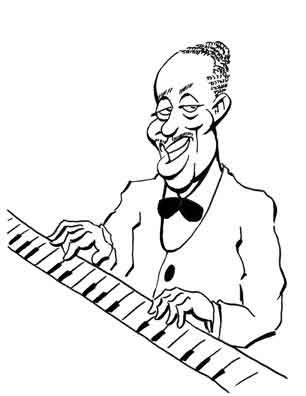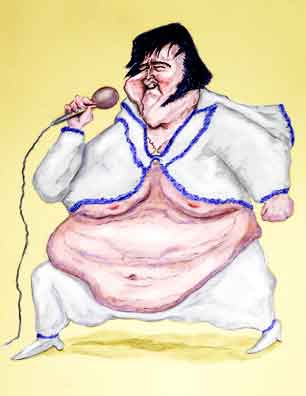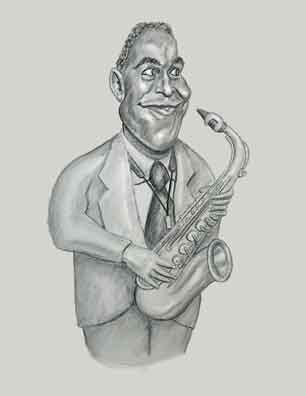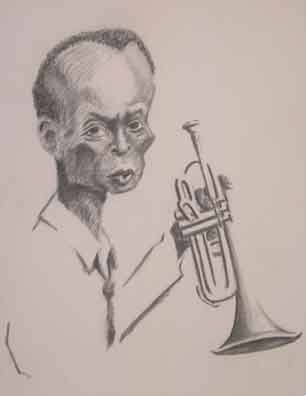
Edward Kennedy Ellington
The Duke

Edward Kennedy Ellington
The Duke
Duke Ellington
It's natural to assume that Edward Kennedy Ellington got his famous nickname from his elegant appearance and sophisticated music. Actually, he got the name as a youngster. Unlike most kids, Edward was polite and gracious and so the name "Duke" just came naturally.
And so when Duke began performing professionally the name stuck. But people may wonder if the King is called the King, why wasn't Duke elevated to that lofty title as well?

If the King was the King ...
We have to admit it. Except for the honor and the money, being a king isn't really what it's cracked up to be. I mean, you have King Henry VIII (known for his many and temporary wives), King John (whose massive incompetency rivals that of many a CEO), Edward VII (known for massacring thousands of birds between massive meals and his visits to establishments dedicated to masculine enjoyment), and we haven't even began talking about ...
Well, never mind.
Duke was born in Washington, D. C., on April 29, 1899. His dad, James Edward Ellington - called J. E. by his friends - was a butler. That was not, though, insubstantial employment. Working in upper crust society, the butler was the household manager and supervised most of the other workers. J. E. was noted for his elegant speech and manners and was once called for duty at the White House.
The Ellington family, then, was part of the genteel and comfortable middle class. With the exception of a bout with pneumonia when he was young, Duke's childhood was uneventful. He admitted his mom, Daisy, if not spoiling him, paid him a lot of attention. Daisy's own mother, Alice, also lived with them and helped take care of Duke and his sister, Ruth.
Like all respectable households, the Ellingtons had a piano in the parlor, and Daisy got her son started early with lessons. His teacher was named - and this is no joke - Marietta Clinkscales. Scholars who initially doubted the story found that there was not only a Ms. Clinkscales living in Washington, D. C., but she was even from Duke's own neighborhood.
Like many young kids studying music against their will, Duke quickly got bored and gave up his study. His work in school was also just so-so. Everyone knew Duke was bright but he didn't study much.
Duke always claimed that in his mid-teens he got back to the piano when he heard the playing of a young man about his age named Harvey Brooks. Unfortunately Duke had no luck finding teachers to teach him to play the popular tunes that were Harvey's speciality.
Then once when Duke was under the weather and laid up at home, he sat down at the piano and began picking out tunes. Soon he had written "Soda Jerk1 Blues" (he had been working after school at a soda fountain2). His next tune was a song with a winkable title, "What Do You Want To Do When the Bed Breaks Down".
Footnote
soda jerk n (1922): a person who dispenses carbonated drinks and ice cream at a soda fountain (Merrian-Webster Collegiate Dictionary (2003)
Footnote
soda fountain n (1824): the equipment and counter for the preparation of serving of sodas, sundaes, and ice cream (Merrian-Webster Collegiate Dictionary (2003)
Word got out that J. E.'s son played a mean piano and wrote his own songs. There were other incentives beyond the praise of his friends. "I was invited to many parties," Duke said, "where I learned that when you were playing the piano there was always a pretty girl standing down at the bass clef end of the piano." Incentive indeed.
Still in high school, Duke began performing with a group at a local club. But he didn't necessarily see music as his avocation and he gravitated more toward art. He won a poster contest where the first prize was a scholarship to the Pratt Institute, a still extant school in Brooklyn that focuses on commercial art and architecture. However Duke didn't complete all the required courses in high school and never graduated. So he never made it to art school.
Although Duke liked the way piano players had the ladies standing at their elbows, his #1 girlfriend was Edna Thompson. They had known each other since they were kids, and they got married in July 1918. Although Duke's marrying at age 19 was not necessarily that early given the era, perhaps there was the need for some haste since eight months later their first child, Mercer, was born. For what it's worth, William Shakespeare's daughter, Susanna, was born six months after Will and Anne's vows were exchanged.
With a family to support, further formal education was not really an option. But Duke called on his artistic ability and opened a sign painting company which actually did pretty well. At the same time he kept playing piano professionally and all-in-all he was making a decent living.
Then one night a professional pianist named Louis Thomas asked Duke to stand in for a small gig. It was simply to play background music at a cocktail party. Louis told Duke to charge $100. They'd split the fee - $90 for Louis and $10 for Duke.
Seeing how much an independent musician could make, Duke decided to branch out on his own. He took an ad out in a newspaper, and from then on he had steady work.
Today it seems amazing that Duke could find work as easily as he did. How, we wonder, was that possible?
Well, for one thing, we have to admit it. Duke was good. But most of all, for musicians these early years were a seller's market.
When Duke started playing professionally, good music had to be live music. In 1915, recordings were still acoustical - electric technology was about ten years away - and sounded like the band was playing from the depths of a subterranean cavern. Sound systems, even if available, were primitive, and it just wasn't possible to use recordings for public entertainments.
Secondly, dancing had become one of the popular activities for the young and old. You didn't just go out to dinner and a show. You went out for dinner, dancing, and a show. Dance halls and clubs abounded from Stringtown, Oklahoma to New York City. They all needed live bands.
Next - and a point that was important for Duke and his friends - black musicians could play for white audiences. Even big name hotels and clubs would hire black bands for high society events. Of course the musicians had to enter and leave by the back door, but at least they did get paid.
Finally, there was a new musical revolution underway. When Duke began serious playing at about age 14, there was a new musical genre called ragtime. The music had emerged in the 1890's from the American Midwest, with the main push coming from Sedalia, Missouri (of all places). Largely written for solo piano and influenced by popular music from the African-American culture, ragtime was marked by bouncy syncopated melodies and strong upbeats. It's hard to listen to ragtime and sit still.
Ragtime as a phenomenon was fairly short lived. Although never abandoned - it still has its fans - from about 1910 it was overtaken by music from the black sections of New Orleans. Unlike ragtime, the New Orleans music was largely for wind instruments, particularly trumpet (or cornet), trombone, clarinet, and increasingly saxophone. Pianos, although taking an increasingly back seat to the other instruments, was often part of the combos with drums providing additional percussion. By 1917, a new name had been coined for the music, jass, or in a later and more durable spelling, jazz.
The origin of the word jazz is one that has bedeviled etymologists for over a century. One of the most authoritative sources simply says it is "a kind of ragtime dance, music to which it is danced. 1917. orig. US." This is certainly an oversimplification and doesn't tell us much.
However, more recent work has pushed the origin of the word back a few years. It has been attested in 1912 as being part of baseball slang meaning "lively" (still used when saying you want to "jazz [something] up") and had referred to music from at least 1915. During the Prohibition Era, the word began to mean the same as - to borrow from the famous song - making whoopee. In naturalistic literature from the 1930's you'll find the male characters talking about finding "a fast a furious jazz".
Ironically although jazz had roots going back to Africa, it only achieved widespread popularity after a group of white musicians began calling themselves (inaccurately) the Original Dixieland Jazz Band. Because the band members denied (also inaccurately) the African-American origins of their music, it became acceptable for the population at large. Of course, although the parents of young jazz fans were shocked! shocked! at the effects of the music on their kids, the popularity of jazz arose so suddenly that by 1922, the phrase the Jazz Age was already in use.

Charlie Parker
He also relocated.
Like Charlie Parker some years later, Duke was convinced he could be a success if he relocated (Charlie was from Kansas City). Certainly if you liked Dixieland, the place to go was New Orleans. But for the producers of the newer and more sophisticated sound, you headed to New York.
Duke and Edna moved to Harlem and not surprisingly, Duke quickly found work. Bands were expected to have a "leader" and Duke, with his elegant and polished manners, was a natural. As far as we can tell Duke drank little and developed a reputation for both his skill and reliability. He later said that a musician had to be in complete control of his facilities to do his best. As far as drugs, he said "I wouldn't know a pusher from a puller."
Duke was well aware that jazz musicians were often seen as drug addicts. He was also naturally defensive toward his band members. One critic noticed that during a performance, one of Duke's musicians had been slumped in his chair, apparently comatose. When the critic suggested this might hurt the band's reputation, Duke was affronted. The man, Duke said, had malaria.
Of course, an advantage of a big band is that you had other members who could step in and take over for another player. But a disadvantage of a big band is, well, it is a big band. The fees may be high in absolute terms, but when divvied up among musicians - particularly top notch musicians - the per-capital take may not be that great. Employee turnover was often high.
Logistics could also be a nightmare just going from one performance to another. A popular band leader of the 1940's named Tommy Tucker was once asked wasn't his job a glamorous way to make a living. Reportedly Tommy - whose real name was Gerald Duppler - replied, "Glamorous, yes. Living I'm not so sure."
Duke found that the - ah - job perk he noted as a teenager was redoubled when he became a practiced professional and particularly when he began playing the famed Cotton Club in Harlem. We don't know the exact circumstances but word got out that Duke and various young ladies were enjoying each others' company.
When Edna heard the stories she flew into a rage and at home, she confronted Duke. Evidently the discussion quickly went downhill since at one point Edna grabbed a knife and slashed Duke's face. This left Duke with a permanent scar, and of course, the incident also permanently affected the pair's relationship. Although Duke and Edna remained married, they lived apart from then on.
By the 1930's Duke was one of the most famous jazz musicians in America. He began making international tours which he continued for more than forty years. And yes, on one of the tours he met the Royal Family and Queen Elizabeth.
But Duke was most notable for the original compositions his band played. Of course, he didn't do all the writing himself. "Take the A-Train", which is usually seen as Duke's signature song, was written by Duke's long time collaborator Billy Strayhorn. But all the music - "Sophisticated Lady", "Mood Indigo", "Cotton Tail", "Ko-Ko3" have structures, melodies, and harmonies more complex than those of the early jazz era. Although Duke led a big band and his music is sometimes labeled "swing", the sound had much in common with the developing "cool" jazz of Miles Davis.
Footnote
Not to be confused with the be-bop composition of the same name by Charlie Parker.

Miles Davis
Cool
Like all jazz musicians, Duke found that demand for his music dropped off with the onslaught of rock and roll. However, there was an emerging entertainment medium called television which picked up some slack. Fees on a television program could be high for a legend even if he played only one or two songs. Duke also found he could appear on the even more new-fangled "entertainment" (note quotes), the talk show. All he had to do was sit back and talk, and that came easily for the elegant and polished Duke.
We said that Duke disavowed drugs and excess alcohol. But he was also a heavy smoker and eventually this took its toll. In 1973, he was diagnosed with lung cancer and died a year later. He was 75.
But Duke kept going almost to the end. The jazz critic Nat Hentoff saw Duke right after one of his later tours. He looked terrible.
"Duke!" Nat cried. "What don't you retire?"
"And do what?" Duke asked.
References
Duke Ellington, James Collier, Oxford University Press, 1987.
Duke Ellington and His World, A. H. Lawrence, Routledge, 2001.
Duke: A Life of Duke Ellington, Terry Teachout, Avery, 2013.
"To Ellington Fan, Duke Is the King", Amy Rosenfeld, The New York Times, December 8, 1991.
The Oxford Dictionary of English Etymology, Oxford University Press, 1966.
"Jazz", Online Etymological Dictionary.
Studs Lonigan, James T. Farrell, Vanguard, 1932, 1935, 1936, Random House, 1938.
"Narcotics and the Jazz Musicians", Playboy Magazine, November, 1960.
"Duke Ellington: American Musician", Encyclopedia Britannica.
"Duke Ellington - Songwriter, Pianist, Conductor (1899-1974)", Biography.
"The Queen and the Royal Family's Love of Jazz", Martin Chilton, The Telegraph, April 21, 2016.
"The Duke's Bittersweet Final Night", Alex Fiore, Northern Star Media, May 2, 2012.
"King John: The Most Evil Monarch in Britain's History", Marc Morris, The Telegraph, June 13, 2015.
"Dixie Jass Band One Step", The Orignal Dixieland Jass Band, Victor 18255, February 26, 1917
Jazz, Ken Burns (Director), Geoffrey Ward (Writer), Joe Thomas (Producer), PBS, 2001.
Return to Duke Ellington Caricature